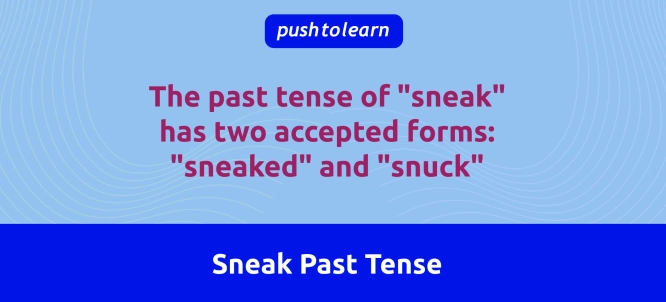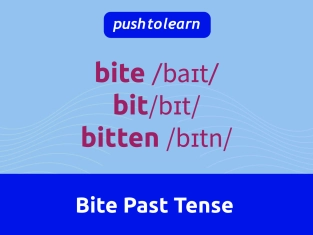by PushtoLearn
Sneak Past Tense
Table of Contents
Sneak Past Forms - Exercises
These exercises test different forms of the verb SNEAK and IRREGULAR VERBS
Meaning
The verb "sneak" means to go somewhere secretly and quietly in order to avoid being seen or heard.
|
Tense |
Form |
Example |
|
Present |
sneak |
"I sneak out quietly." |
|
Past |
sneaked/snuck |
"I sneaked out last night." / "I snuck out last night." |
|
Past Participle |
sneaked/snuck |
"She has sneaked in before." / "She has snuck in before." |

How to Use "Sneaked" and "Snuck" (Past Tense of Sneak)
Both "sneaked" and "snuck" are acceptable as past tense forms of "sneak." The choice between them usually depends on formality and regional preference.
-
Examples with "sneaked" (more formal):
-
"He sneaked into the room quietly."
-
"They sneaked past the guard."
-
Examples with "snuck" (informal, especially in American English):
-
"She snuck into the party without a ticket."
-
"He snuck out when nobody was looking."
Common Usage Tips
-
Sneaked: Preferred in formal writing and British English.
-
Snuck: Common in American English and informal speech, but becoming more accepted in general usage.
Examples in Sentences
-
Describing Past Actions:
-
"The cat sneaked out the door while it was open."
-
"We snuck into the theater without being seen."
-
"He sneaked a piece of candy before dinner."
FAQ
What is the past tense of "sneak"?
Both "sneaked" and "snuck" are acceptable as past tense forms.
Which is more common: "sneaked" or "snuck"?
"Snuck" is more common in American English, while "sneaked" is often preferred in British English and formal writing.
Is "snuck" considered correct English?
Yes, "snuck" is widely accepted in informal contexts and is gaining broader acceptance.
Can I use "snuck" in formal writing?
While "sneaked" is still preferred in formal writing, "snuck" is increasingly used and accepted in both formal and informal contexts.
Can I say "I have snuck"?
Yes, "snuck" can also serve as the past participle, so "I have snuck" is correct, as is "I have sneaked."

